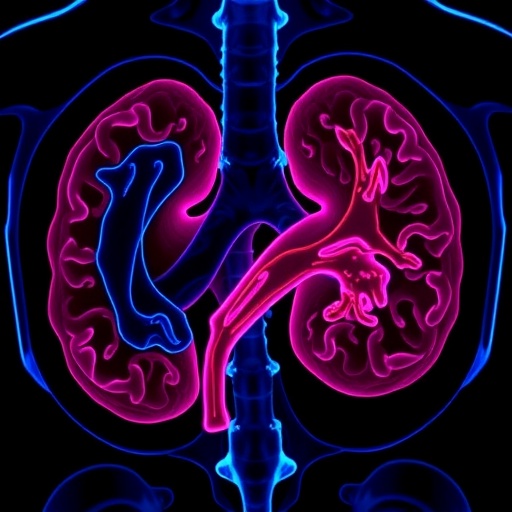In a groundbreaking revelation that challenges the current paradigms of cancer immunotherapy, researchers have reported that the combination of nivolumab and ipilimumab—two of the most widely used immune checkpoint inhibitors—can paradoxically accelerate tumor progression in a rare but aggressive cancer known as renal medullary carcinoma (RMC). This discovery, emerging from a meticulously designed phase II clinical trial complemented by comprehensive preclinical models, illuminates a critical, previously underappreciated facet of immunotherapy, raising profound implications for clinical oncology and personalized medicine.
Renal medullary carcinoma is an exceptionally aggressive neoplasm predominantly affecting young patients with sickle cell trait or disease, characterized by a notoriously poor prognosis and scant therapeutic options. Conventional treatments have shown limited success, imparting an urgent need for novel strategies. Immune checkpoint inhibitors, particularly those targeting the PD-1 and CTLA-4 pathways, have revolutionized treatment landscapes in various malignancies by reinvigorating exhausted T cells and overcoming tumor immune evasion. However, the study led by Soeung and colleagues reveals a counterintuitive response in RMC patients treated with the combination of nivolumab (anti-PD-1) and ipilimumab (anti-CTLA-4).
The phase II trial enrolled patients with advanced renal medullary carcinoma and subjected them to dual immune checkpoint blockade. Contrary to expectations of tumor regression or stabilization, investigators observed rapid tumor growth and clinical deterioration, indicative of hyper-progression—a phenomenon where treatment accelerates tumor expansion rather than containing it. This unexpected adverse outcome prompted an in-depth examination into the immunological and molecular underpinnings driving such hyper-progression.
Preclinical studies using patient-derived xenografts and genetically engineered murine models substantiated the clinical findings. The research demonstrated that while nivolumab plus ipilimumab effectively unleashed immune activity in many cancer contexts, in RMC, this therapy instead remodeled the tumor microenvironment to favor aggressive tumor phenotypes. Key mechanistic insights revealed that dual checkpoint blockade triggered hyperactivation of certain immunosuppressive myeloid populations and induced upregulation of pro-tumorigenic cytokines and growth factors, creating a feedback loop that accelerated malignancy.
At the molecular level, transcriptomic analyses illustrated that the interrogated tumors showed an unexpected enrichment of gene signatures associated with epithelial-to-mesenchymal transition (EMT), cell proliferation, and angiogenesis after treatment initiation. These alterations correspond with enhanced invasiveness, metastatic potential, and rapid tumor burden increase. The data cautions clinicians that the blanket application of checkpoint inhibitor combinations, while beneficial in many cancers, may be deleterious in certain histological or genetic contexts such as RMC.
Immunologically, the research highlighted a paradox wherein checkpoint inhibition relieved T cell exhaustion markers like PD-1 and CTLA-4 expression, but simultaneously fostered an environment rich in regulatory T cells (Tregs) and myeloid-derived suppressor cells (MDSCs), which suppress effective anti-tumor immunity. This immunosuppressive milieu, fueled by treatment-induced cytokines such as interleukin-10 and transforming growth factor-beta, effectively sabotaged the intended immune activation, blunting cytotoxic responses and facilitating tumor outgrowth.
Furthermore, the study suggests that the genomic landscape of RMC—featuring SMARCB1 (INI1) loss and complex chromosomal rearrangements—may predispose tumors to such adverse immunotherapy responses. This highlights the necessity for molecular stratification before immunotherapy administration to predict patient susceptibility to hyper-progression and avoid fatal accelerations in disease.
Clinically, this research compels oncologists to exercise heightened vigilance and consider alternative therapeutic avenues for RMC patients. The detrimental effects elicited by nivolumab and ipilimumab combination therapy underscore an urgent need for biomarker-driven trials and development of personalized immunomodulatory strategies, perhaps involving nuanced targeting of the tumor microenvironment or integration with agents that mitigate myeloid-driven immunosuppression.
Moreover, the implications of hyper-progression extend beyond RMC. This phenomenon has been sporadically reported in other cancer types but remained mechanistically elusive. The integrative approach combining trial data with detailed preclinical modeling in this study offers a template for exploring hyper-progression mechanisms and underscores the complexity of immune-oncological interactions across diverse tumor milieus.
Given the expanding use of combination immunotherapies across a spectrum of cancers, understanding which patients may experience hyper-progression is paramount. This study not only identifies a critical risk subset but also innovates a conceptual framework for future research: meticulously dissecting tumor immunobiology in the context of host genetic makeup can unveil paradoxical treatment responses and inform safer, more effective clinical protocols.
In the broader landscape of cancer therapeutics, these results remind the field that immune system manipulation is a double-edged sword, requiring precision engineering. The simplistic notion that lifting immune checkpoints uniformly unleashes tumor-eradicating T cells is challenged by evidence demonstrating that complex cellular ecosystems interact and sometimes respond unpredictably. Thus, the path forward lies in integrating multi-omics profiling, immune cell dynamics tracking, and functional assays to tailor immunotherapy regimens.
This study also reignites discussions about hyper-progression biomarkers, emphasizing the need for early predictive tests. Peripheral blood markers, imaging-based algorithms, or liquid biopsies detecting specific immune signatures could serve as vital tools for clinicians to monitor and adapt treatment courses dynamically, potentially salvaging patients from rapid decline.
In conclusion, the research by Soeung et al. profoundly reshapes our understanding of immune checkpoint blockade’s dualistic nature, particularly in renal medullary carcinoma. By revealing that nivolumab plus ipilimumab can induce hyper-progression, this work provokes critical reassessment of immunotherapy algorithms, stresses individualized therapeutic design, and opens novel investigative avenues to mitigate risks associated with current cancer immunotherapies. As the cancer community strategizes next-generation treatments, this landmark study reminds us that immune modulation requires not only enthusiasm but caution, deep biological insight, and continuous vigilance.
Subject of Research: Renal Medullary Carcinoma, Immune Checkpoint Inhibitors, Hyper-Progression, Cancer Immunotherapy
Article Title: Nivolumab plus ipilimumab induce hyper-progression in renal medullary carcinoma: results of a phase II trial and preclinical evidence
Article References:
Soeung, M., Yan, X., Zanca, C. et al. Nivolumab plus ipilimumab induce hyper-progression in renal medullary carcinoma: results of a phase II trial and preclinical evidence. Nat Commun 16, 10474 (2025). https://doi.org/10.1038/s41467-025-65462-z
Image Credits: AI Generated




